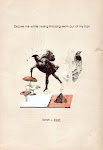In erasure there must be revelation, and the presentation of these fine little poems emphasizes that - black words plucked from the pale source, the sonnets set upon the creamy page with nothing placed opposite to distract the reader.
Many of these poems stand strongly on their own, but it’s not possible for me to divorce the poems themselves from the concept and the presentation. So even where some of the poems would not travel so boldly alone, I open my eyes wider and take in the full text engulfing the poem found inside it, and all I can say is “wow.” I really loved these - even the paper it’s printed on is sumptuous.
I don’t buy the oft-touted view that one must find something totally new in erasure poetry, that the found poem should be completely independent of the source text. If that’s the case then why do erasure at all? The source is going to offer possibilities and choices. The source is at the poet’s disposal, and will set limits. The source is not going to predetermine, but it is going to influence.
I love Bervin’s note at the end of the book: “When we write poems, the history of poetry is with us, pre-inscribed in the white of the page.”
Here is an excerpt that should help you decide if you are interested in owning this book, which I obviously recommend.




